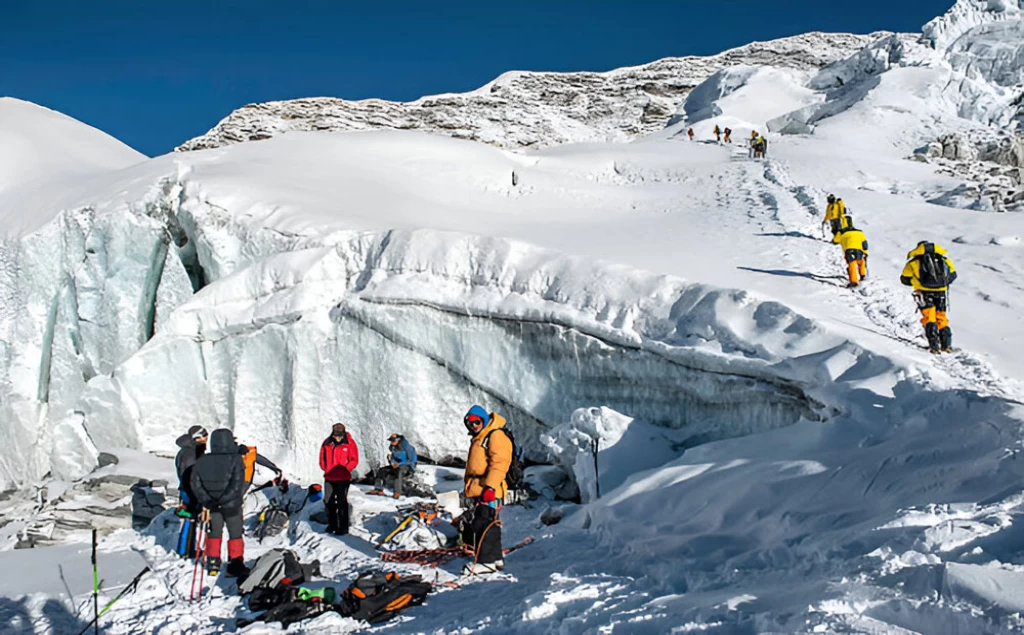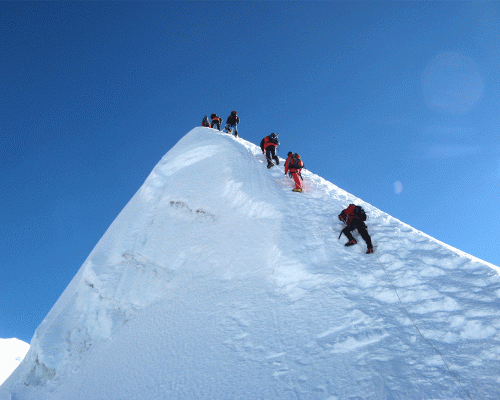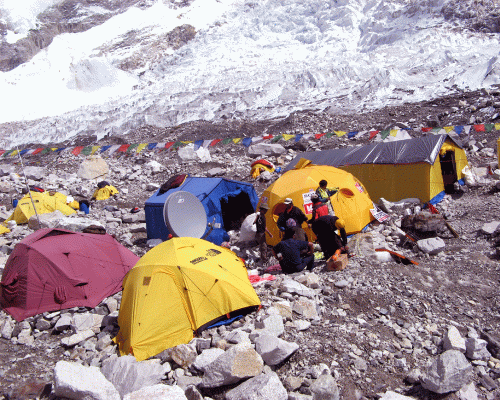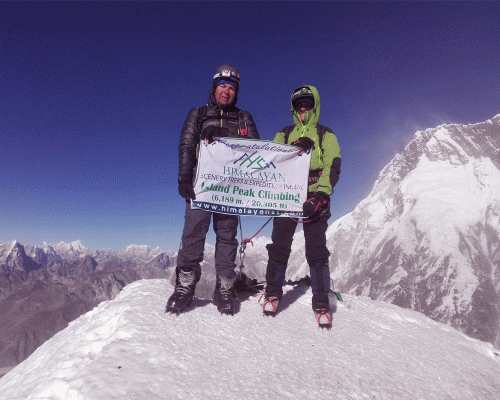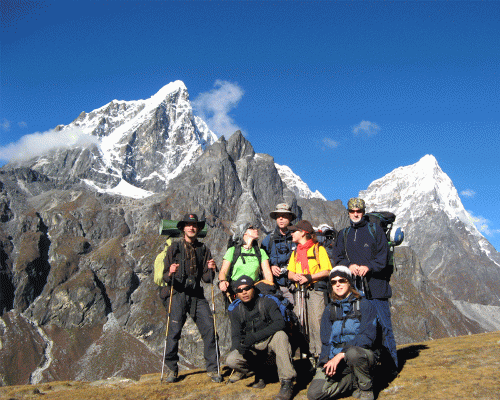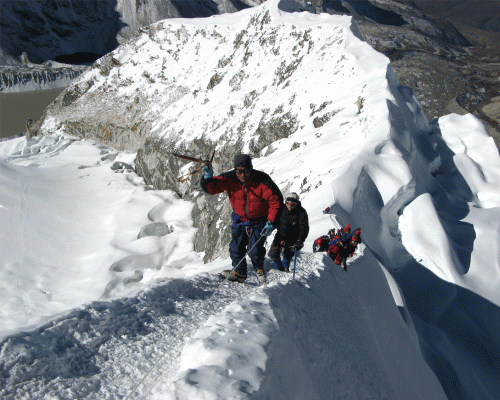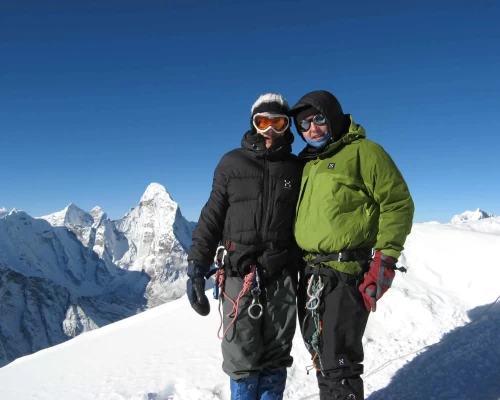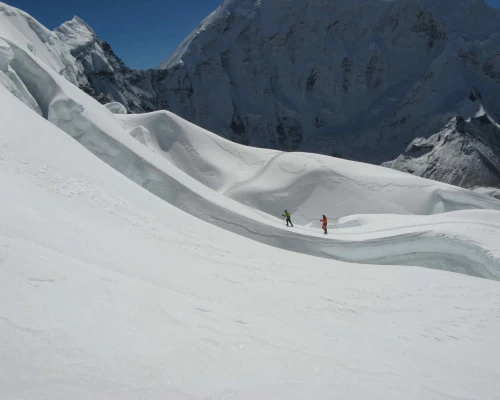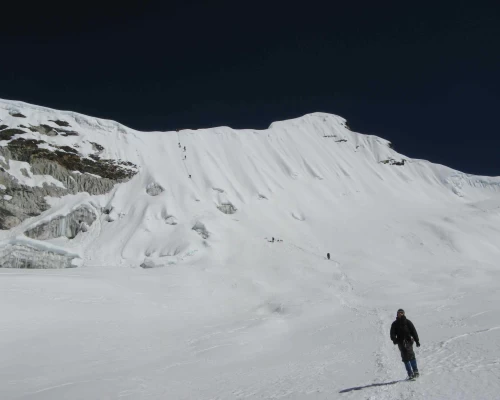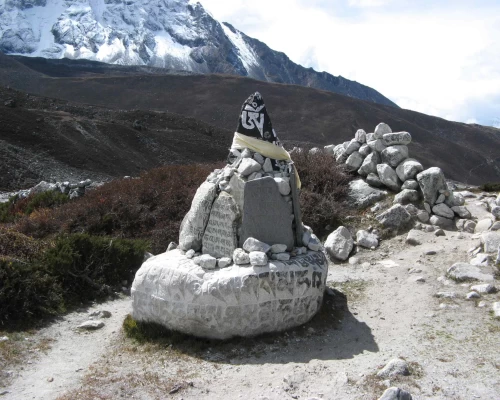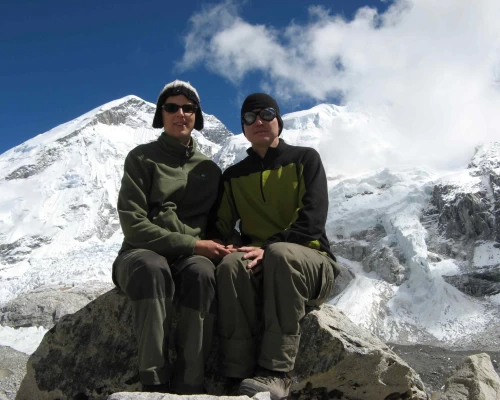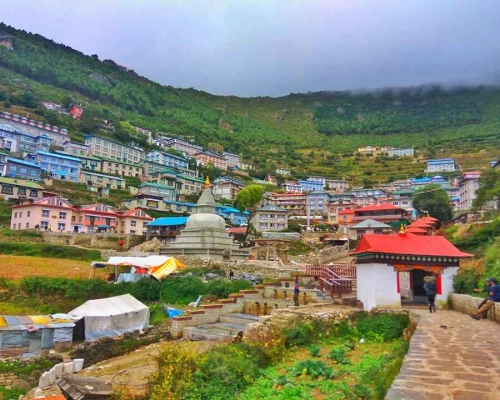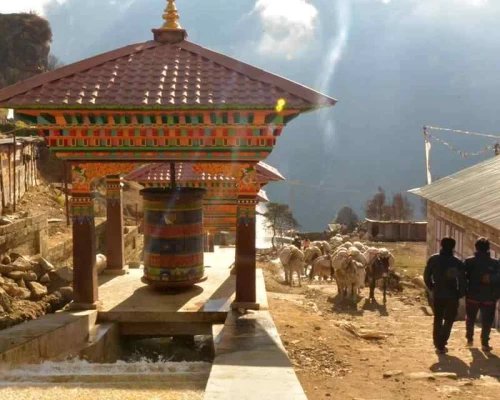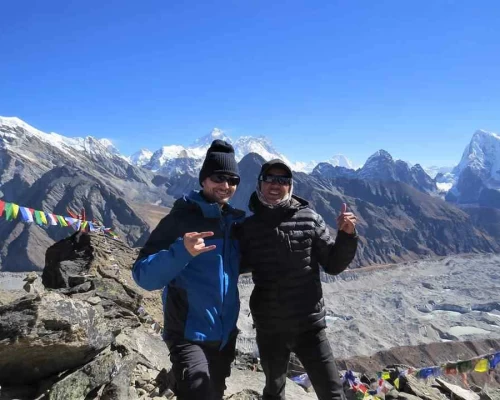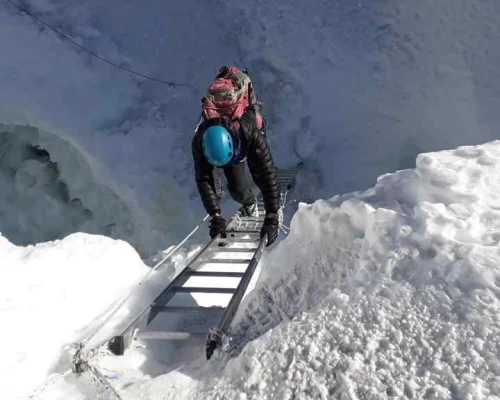In Himalayan Scenery Treks and Expedition, your safety precedes every other thing. As this adventure entrails travelling in the remote mountainous region, we are always at the mercy of nature. During the trip, factors such as weather, natural disasters, or a multitude of other factors which are beyond our control can subsequently bring changes to the itinerary.
Although all the itinerary we provide to you is guided and standard; please note that your team leader has the authority to alter or even drop the planned itinerary of any part if it is necessary due to safety concerns. All the alternations or changes to the standard itinerary are made by the leader by taking into consideration the best interest of the whole group.
We give our best effort to stick with the above-mentioned itinerary; however, in case of any unpredicted event which is beyond our control, you need to be flexible and follow the guidelines as instructed by your leader.
Note: The company won't be responsible for any result of alterations to itineraries or any delays due to unforeseen circumstances.
Training and Fitness Requirements
Endurance training and acclimatization are key to a successful summit of Island Peak. Climbers need to be physically prepared for the challenging ascent, which includes long days at high altitudes. Acclimatization ensures your body can adjust to reduced oxygen levels, preventing altitude sickness.
Recommended fitness levels include regular strength and cardio training. Cardiovascular exercises, like running and cycling, will help with stamina, while strength training will prepare your body for climbing. Training should also include practice with fixed ropes, crampon use, and glacier travel to build confidence and technique for the technical sections of the climb.
Permits and Regulations
Climbing Island Peak requires several important permits to ensure a smooth and legal journey. These include the Sagarmatha National Park entry permit, the Khumbu Pasang Lhamu Rural Municipality Fee, and the Island Peak climbing permit. These permits help protect the environment and regulate access to the area.
At Himalayan Scenery Treks and Expedition (HST), we manage all the necessary logistics for acquiring these permits. We handle the permits on your behalf, saving you time and ensuring everything is in order. The Sagarmatha National Park entry permit costs around NPR 3,000, the Khumbu Pasang Lhamu Rural Municipality Fee is about NPR 2,000. We work closely with the Nepal Mountaineering Association (NMA) to ensure all safety and regulatory standards are met, allowing for a seamless climbing experience.
Climbing Island Peak requires the following permit fees, which vary depending on the season:
Spring (March to May): USD 250 per person
Autumn (September to November): USD 125 per person
Winter (December to February): USD 70 per person
Additionally, there is a garbage deposit of USD 500 per person to acquire the climbing permit. This deposit is refundable according to the provisions set by the Nepal Mountaineering Association (NMA), provided all conditions are met.
Flight Delay in Kathmandu and Lukla
Tenzing Hillary Airport, also known as Lukla Airport, is the small but busiest airport situated in a wonderful valley fenced by high mountains. This airport has been carved into a mountain ridge and sites by a perilous three-kilometre drop. Because of the high location, the weather around here is erratic and is likely to be changed every few hours resulting in flight delays and cancellations.
Twin Otter and Dornier planes are the only modes of transportation to and from Lukla Airstrip. However, because of the unpredictable weather of the high mountains reason, there is always the risk of flight cancellation or delays. In some cases, the flights are delayed or cancelled for 2 or more days. The long delays in the flight schedule may hinder your trip. However, we Himalayan Scenery Treks and Expedition, help you Charter a helicopter to or from the Lukla Airstrip, in case of flight cancellation or delays due to harsh and unpredictable mountain weather conditions. We will provide you with the best service to make sure that you are on schedule for your trip and international flight connection.
To charter a helicopter to or from the Lukla Airstrip, you will be charged approximately 2500 USD to 4,000 USD per Helicopter. The helicopter conveys 4 to 5 passengers at a time, so the aggregate chartered fee can be shared amongst the passengers (USD 500 to USD 3000 is applicable per person). The cost of this service is payable directly to our office, and later this can be submitted to the travel insurance company for reimbursement. Our company will provide you with all the required documentation for the claim.
Team Composition
Team composition is important to ensure the safety and comfort of the climbers. We observe high safety standards, therefore, for 2 International Climbers, we assign:
HST Accredited Climbing Leader
High Altitudes Assistance Sherpa
Cook
Base Camp Assistance and other necessary trek crew such as Porters, Yaks, and Yak man
Because of our high safety standards, team members would be added as per the number of international climbers.
Hotel and Accommodation on Island Peak Climbing
Trek to the Himalayas is one of the favourite destinations for travel enthusiasts and adventure seekers all around the globe. Although the Himalayan region of Nepal is the most popular trekking destination in the world; there are a lot of things people don't have a clue about. While trekking to the high mountain region, you will not find the hotels and accommodations you see in the city areas. The hotels and accommodations around the high Himalayan have fewer services and facilities. The hot shower may turn out to be simply a bucket of lukewarm water and the toilet may be a latrine behind the hotel. The private room can be a wooden cell with no furniture except a bed, mattress, and curtain in place of the door. So, while trekking to the mountainous region of Nepal, you need to be ready to stay in the less fancy and minimum facilitated hotels.
On the expedition Journey to Mt. Island Peak, we provide you with a 2 to 3-star standard hotel while you are in Kathmandu (i.e. for 3 Nights). During your journey to the Base Camp of Mt. Island Peak, we provide you with the basic lodges and tea houses for your accommodation. The rooms of these lodges and tea houses are less fancier with just a bed, a pillow, and a blanket. The lodges on the trail to Island Peak are always crowded and in some cases, you may have to share a room with other trekkers or may have to sleep in the dining room. We put us every effort to make your trek as cosy as possible. However, you need to stay flexible in some cases. We will accommodate the groups in local lodges available each day. We send the porters ahead of us to pre-book the room for the next day (rooms cannot be pre-booked in all places).
In Kathmandu besides the 2 / 3 star hotel, some 4 / 5 - star luxury accommodation is also available. If you want to change the accommodation plan for the luxury, please do let us know so that we can arrange and book the hotel for you for your Kathmandu stay.
Food and Beverages
All the food and Beverages included on the package to Island Peak Climbing are provided by the company itself. The food is provided in the tea houses or lodges on the trail. We will have breakfast and dinner at the lodge where we stay overnight. On the everyday trek, our guide will decide the available place and stop for lunch. We highly recommend you bring water purification pills, to cleanse the water and drink during the trek. During the trek, there are options for buying bottled water and boiled water as well.
Upon your arrival at Kathmandu after the successful expedition, we will provide a farewell dinner consisting of authentic Nepalese cuisine.
Transportation
We at Himalayan Scenery Treks and Expedition provide all the necessary transportation facilities for your trip. We provide private vehicles for airport pick-up and sightseeing tours around Kathmandu. We likewise provide the flight to and from Lukla Airstrip for the Island Peak Climbing.
Luggage and Backpack
Your main luggage will be carried by your porters during the trek. For your things, we highly recommend you, carry a small handbag containing water bottles, cameras, sunscreen, and other things which you require daily during the trip. Making the backpack small and lighter will unquestionably assist you in enjoying the trip to its fullest. You should simply convey the thing which is basic for your outing and the rest of the garments and different things can be left in the locker room/safe store of hotels. The hotels provide the locker room / safe deposit for free. So, don't hesitate to leave redundant things. While making the backpack or luggage for your trip ensure that the luggage doesn't exceed more than 15 Kg. The weight allowance at Nepal's domestic airlines is 15 Kg including your handbag. Excess weight is chargeable of USD 1.5 or more which will be the additional cost of our trip.
Guide and Porters on Trek
We provide you with a well-trained and experienced guide and porter for your trek. Our guide will assist you in every possible way to make your trips remarkable and memorable. Talking about the porter, we provide one porter for 2 trekkers each. The porters carry 20 Kg of total luggage (10 Kg from each trekker). We provide one guide for the smaller groups and if the group size surpasses 10 individuals; we will provide an additional guide for your trip.
Leaders and Staff Management
Climbing Leader and Staff Management are some of the most critical parts of the Expedition journey determining the success, enjoyability, and memorability of the trip. A highly experienced, skilled, and courteous climbing leader will make the expedition journey smooth and easy. At Himalayan Scenery Treks and Expedition, all the expedition crew members along with the climbing leader are carefully selected based on their appropriate leadership skills and personal aptitude. To sustain local communities, Himalayan Scenery Treks and Expedition only employ local staff who have adequate knowledge about the culture, ecosystem, flora, fauna, geography, and history of their local region(s). The trek and expedition leaders have undergone the following training:
Intensive Wilderness First Aid
Trekking Guide Training
Eco Trekking Workshop and Adventure Meet
English Language
Conservation and Biodiversity
Rock climbing, Ice Climbing, and Mountaineering (for expedition leaders)
Personnel Expenses
Personnel Expenses are largely influenced by your habit of expenditure. We provide you with all the necessary food and accommodation facilities inside the cost of your Island Peak Climbing. So, you only need money to pay for your drinks (alcoholic and non-alcoholic beverages) and snacks while strolling on the trail. You will get a significant number of smaller shops on the trail to buy drinks and snacks.
Likewise, you can also use the money to buy souvenirs for the trip, entrance tickets, hot showers, tips, and many more. Note that, tips and gratuities are not mandatory, but it is fine if you wish to. If you feel like the service provided to you is excellent, then you can tip directly to the staff. Of course, there is no obligation to tip if you are disappointed with the service you receive. As a suggestion, we advise you to allocate an amount of 5 - 10%of the total package price for tips. The amount you give depends on your budget and appreciation of their work.
Alternative Routes and Add-ons
Climbers can extend their Island Peak Expedition by adding options like Everest Base Camp Trek or Gokyo Lakes. These add-ons provide a chance to explore more of the Khumbu region while enjoying stunning views and unique experiences.
Everest Base Camp offers a closer look at the world’s highest peak and its surrounding glaciers. The Gokyo Lakes route takes you through beautiful, turquoise lakes and offers incredible views of Everest, Lhotse, and Makalu. Both options add more scenic variety and cultural richness to the overall adventure.
